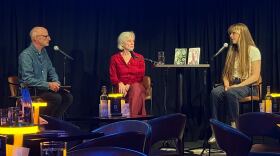Depending on who you ask, pop culture can be an indulgence or worthy of serious reflection. In her new book, “Wannabe: Reckoning with the Pop Culture that Shapes Me,” NPR’s Pop Culture Happy Hour co-host Aisha Harris mines the tropes and impacts of pop culture on our country and on herself.
NHPR’s Morning Edition host Rick Ganley spoke with Harris about the pop culture that draws her in and how her job as a critic has evolved.
Transcript
Can you give us an example of some of the pop culture that you've consistently been drawn to and its impact on you?
One of the essays is about the idea of the Black friend in popular culture. So movies and TV shows – everything from the teen movies that I grew up with like "She's All That" [and] shows like "New Girl." And I wanted to explore what it means to be the Black friend in popular culture and also how that reflected on me as a Black kid who grew up in a predominantly white suburb.
When I look at these characters, I always wonder, 'What else do they have going on besides their attention drawn to this white protagonist?' And I think that for a while when I was growing up, I felt as though my story was not as significant as that of my white friends. And it definitely impacted how I viewed myself and how I thought of who I could be in this world.

And I think one of the things I explore when it comes to the Black friend as it plays out in TV and pop culture is the fact that it's kind of like a descendent of the Black servant or Black maid in the older movies that we saw. Whether it was "Gone With the Wind," Eddie "Rochester" Anderson, who was the sidekick of Jack Benny – there's a similar thing going on there, except instead of being a servant in profession, they're kind of a servant in an emotional way. And so I really wanted to sort of draw those connections and take a look at this trope that is so familiar and so common and see how it also tends to play out in real life.
How do you think the role of the reviewer and its purpose as an observer of pop culture has changed? How do you think that has evolved?
I think we live in a time now where everyone can be a reviewer. Social media allows everyone to offer their critique of the things that they consume. And on the one hand, I think that's a great thing. I think that everyone should be able to freely express those opinions.
I also think that it's made it a little bit difficult for someone like myself as a critic because people tend to take these things personally. And one of the things that I talk about in the book is how we've kind of gotten to this point now where if one person says they don't like something, but you like that thing, you feel as though it's a direct attack on who you are.
I think this is especially true with something like the recent movie "The Little Mermaid," the remake, which I reviewed negatively for several reasons. It was interesting to see people react to it and react to my review and say, 'How dare you? This is a kid's movie. And it's a movie where Black little girls can see themselves.' And while I think that representation is important, I also think that art is important. And I don't think representation is the sole measure of whether something is worthy or worth giving a positive review for.
There is a scarcity problem still, and there are still issues when it comes to representation. But I also think we need to be able to separate the two to some extent and really take everything into account. One of the things I hope people get out of this book is an ability to sort of understand that we don't have to connect everything to our identity. We can love the things we love or hate the things we hate without always putting it on who we are demographically.









